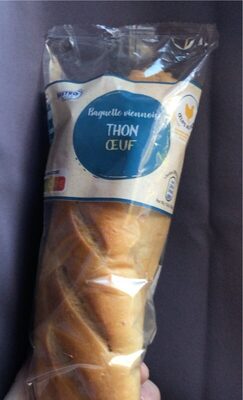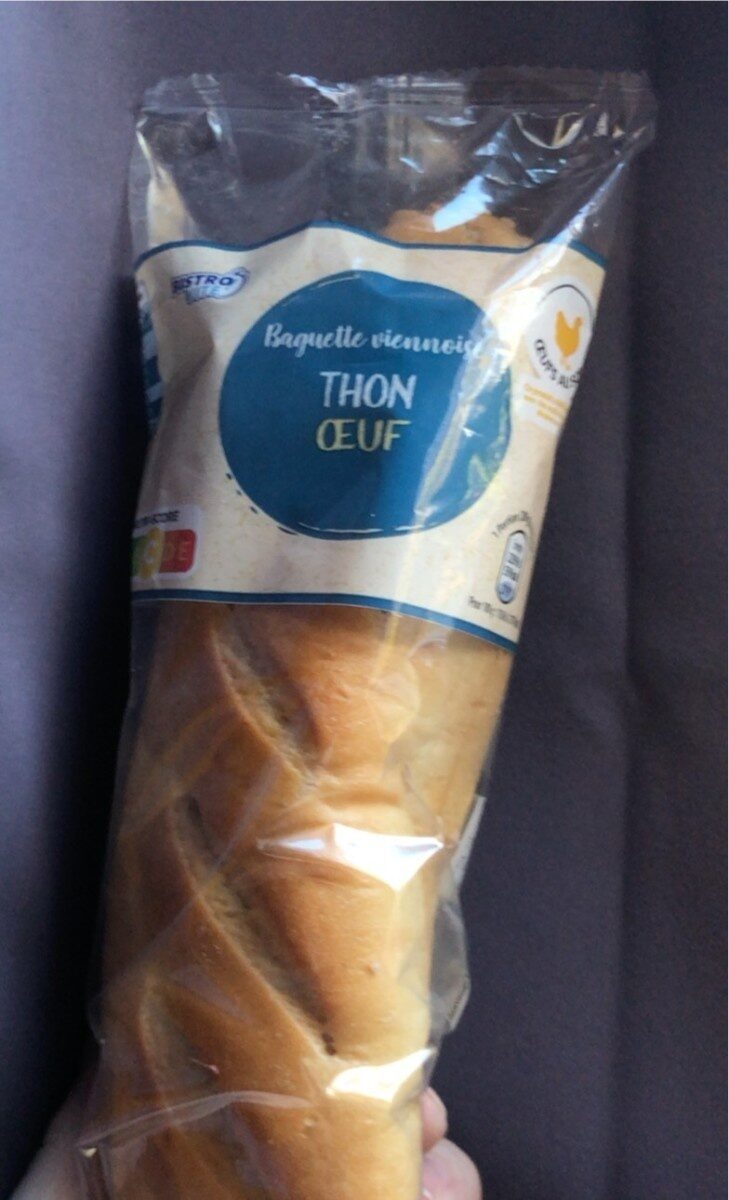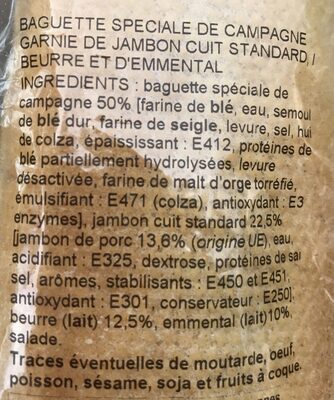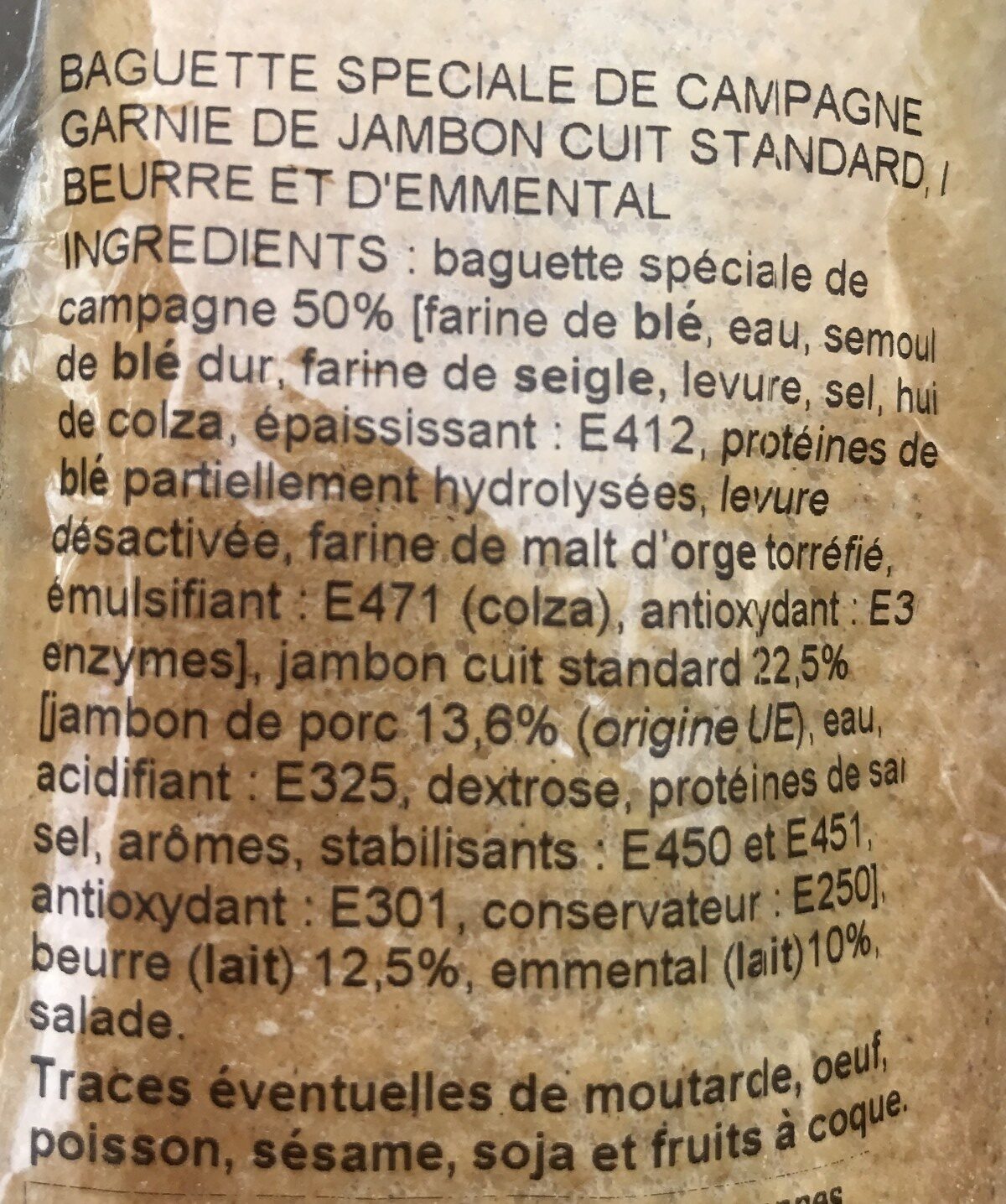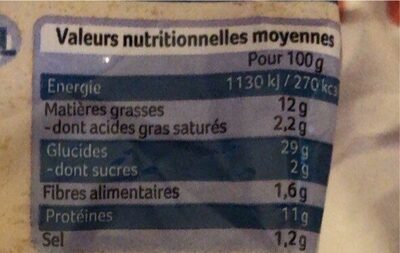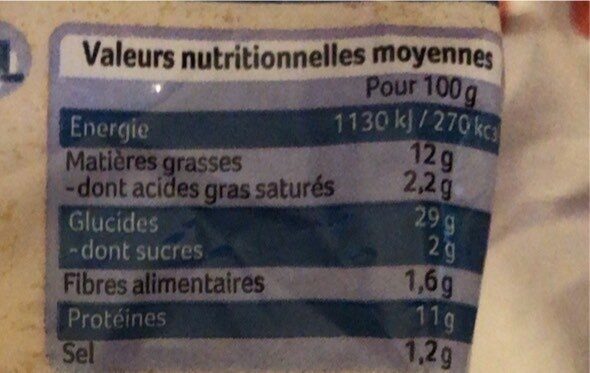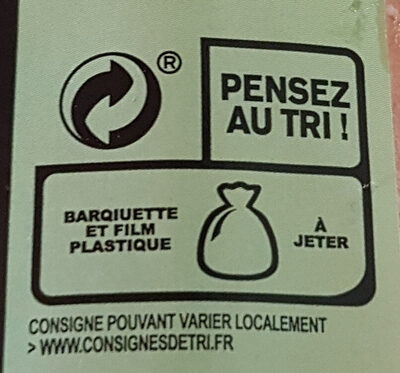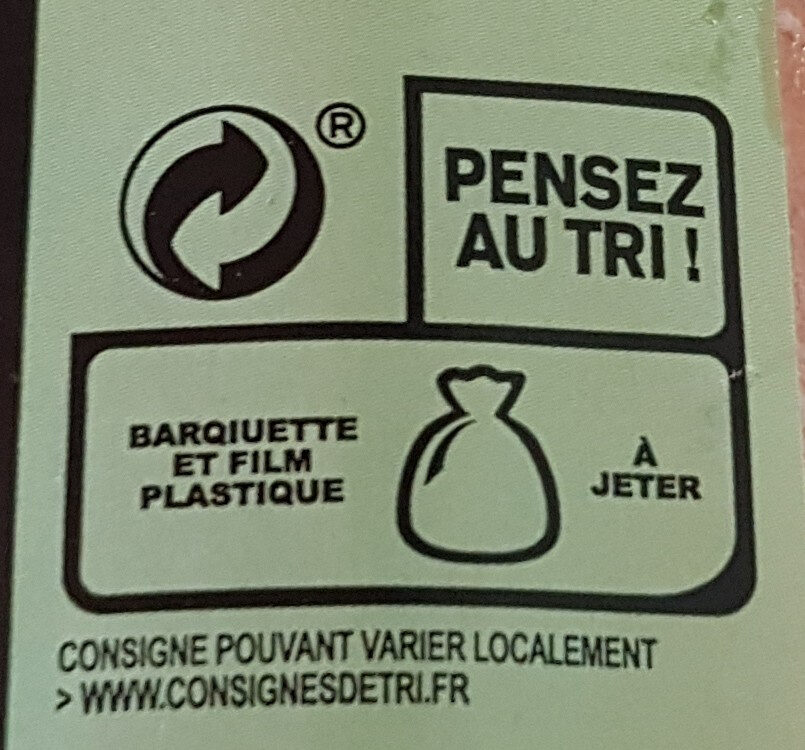Help us make food transparency the norm!
As a non-profit organization, we depend on your donations to continue informing consumers around the world about what they eat.
The food revolution starts with you!
Baguette viennoise Thon œuf - Bistro Vite ! - 200 g e
Baguette viennoise Thon œuf - Bistro Vite ! - 200 g e
Ambiguous barcode: This product has a Restricted Circulation Number barcode for products within a company. This means that different producers and stores can use the same barcode for different products.
×
Barcode: 26066240
Quantity: 200 g e
Packaging: Plastic, Fresh, fr:Film en plastique
Brands: Bistro Vite !, Aldi
Categories: Meals, Sandwiches, Fish sandwiches, Sandwiches filled with cold cuts, Ham sandwiches, Tuna sandwiches
Labels, certifications, awards:
Green Dot
Origin of ingredients: European Union
Stores: Aldi
Countries where sold: France
Matching with your preferences
Health
Ingredients
-
44 ingredients
French: Farine de blé, jambon cuit standard (jambon de porc (origine UE), eau, sel, lactose, bouillon de porc, dextrose, stabilisant : E451, gélifiant : E407, arôme naturel, sirop de glucose, antioxydant : E316, conservateur : E250, ferments), eau, huile de colza, œuf, tomate, levure, beurre, jaune d'œuf, moutarde (eau, graines de moutarde, vinaigre d'alcool, sel), sel, sucre, gluten de blé, lactose, vinaigre d'alcool, amidon de maïs, poivre, curcuma, émulsifiant : E471 (colza), agent de traitement de la farine : E300.Allergens: Eggs, Gluten, Milk, Mustard
Food processing
-
Ultra processed foods
Elements that indicate the product is in the 4 - Ultra processed food and drink products group:
- Additive: E407 - Carrageenan
- Additive: E451 - Triphosphates
- Additive: E471 - Mono- and diglycerides of fatty acids
- Ingredient: Dextrose
- Ingredient: Emulsifier
- Ingredient: Flavouring
- Ingredient: Gelling agent
- Ingredient: Glucose
- Ingredient: Glucose syrup
- Ingredient: Gluten
- Ingredient: Lactose
Food products are classified into 4 groups according to their degree of processing:
- Unprocessed or minimally processed foods
- Processed culinary ingredients
- Processed foods
- Ultra processed foods
The determination of the group is based on the category of the product and on the ingredients it contains.
Additives
-
E250 - Sodium nitrite
Sodium nitrite: Sodium nitrite is the inorganic compound with the chemical formula NaNO2. It is a white to slightly yellowish crystalline powder that is very soluble in water and is hygroscopic. It is a useful precursor to a variety of organic compounds, such as pharmaceuticals, dyes, and pesticides, but it is probably best known as a food additive to prevent botulism. It is on the World Health Organization's List of Essential Medicines, the most important medications needed in a basic health system.Nitrate or nitrite -ingested- under conditions that result in endogenous nitrosation has been classified as "probably carcinogenic to humans" by International Agency for Research on Cancer -IARC-.Source: Wikipedia
-
E316 - Sodium erythorbate
Sodium erythorbate: Sodium erythorbate -C6H7NaO6- is a food additive used predominantly in meats, poultry, and soft drinks. Chemically, it is the sodium salt of erythorbic acid. When used in processed meat such as hot dogs and beef sticks, it increases the rate at which nitrite reduces to nitric oxide, thus facilitating a faster cure and retaining the pink coloring. As an antioxidant structurally related to vitamin C, it helps improve flavor stability and prevents the formation of carcinogenic nitrosamines. When used as a food additive, its E number is E316. The use of erythorbic acid and sodium erythorbate as a food preservative has increased greatly since the U.S. Food and Drug Administration banned the use of sulfites as preservatives in foods intended to be eaten fresh -such as ingredients for fresh salads- and as food processors have responded to the fact that some people are allergic to sulfites. It can also be found in bologna, and is occasionally used in beverages, baked goods, and potato salad.Sodium erythorbate is produced from sugars derived from different sources, such as beets, sugar cane, and corn. An urban myth claims that sodium erythorbate is made from ground earthworms; however, there is no truth to the myth. It is thought that the genesis of the legend comes from the similarity of the chemical name to the words earthworm and bait.Alternative applications include the development of additives that could be utilized as anti-oxidants in general. For instance, this substance has been implemented in the development of corrosion inhibitors for metals and it has been implemented in active packaging.Sodium erythorbate is soluble in water. The pH of the aqueous solution of the sodium salt is between 5 and 6. A 10% solution, made from commercial grade sodium erythorbate, may have a pH of 7.2 to 7.9. In its dry, crystalline state it is nonreactive. But, when in solution with water it readily reacts with atmospheric oxygen and other oxidizing agents, which makes it a valuable antioxidant.Source: Wikipedia
-
E407 - Carrageenan
Carrageenan (E407), derived from red seaweed, is widely employed in the food industry as a gelling, thickening, and stabilizing agent, notably in dairy and meat products.
It can exist in various forms, each imparting distinct textural properties to food.
However, its degraded form, often referred to as poligeenan, has raised health concerns due to its potential inflammatory effects and its classification as a possible human carcinogen (Group 2B) by the International Agency for Research on Cancer (IARC).
Nevertheless, food-grade carrageenan has been deemed safe by various regulatory bodies when consumed in amounts typically found in food.
-
E451 - Triphosphates
Sodium triphosphate: Sodium triphosphate -STP-, also sodium tripolyphosphate -STPP-, or tripolyphosphate -TPP-,- is an inorganic compound with formula Na5P3O10. It is the sodium salt of the polyphosphate penta-anion, which is the conjugate base of triphosphoric acid. It is produced on a large scale as a component of many domestic and industrial products, especially detergents. Environmental problems associated with eutrophication are attributed to its widespread use.Source: Wikipedia
-
E471 - Mono- and diglycerides of fatty acids
Mono- and diglycerides of fatty acids (E471), are food additives commonly used as emulsifiers in various processed foods.
These compounds consist of glycerol molecules linked to one or two fatty acid chains, which help stabilize and blend water and oil-based ingredients. E471 enhances the texture and shelf life of products like margarine, baked goods, and ice cream, ensuring a smooth and consistent texture.
It is generally considered safe for consumption within established regulatory limits.
Ingredients analysis
-
Palm oil free
No ingredients containing palm oil detected
-
Non-vegan
Non-vegan ingredients: fr:Jambon cuit standard, Ham, Lactose, fr:fond-de-porc, Egg, Butter, Egg yolk, Lactose
-
Non-vegetarian
Non-vegetarian ingredients: fr:Jambon cuit standard, Ham, fr:fond-de-porc
-
Details of the analysis of the ingredients
fr: Farine de _blé_, jambon cuit standard (jambon de porc, eau, sel, _lactose_, bouillon de porc, dextrose, stabilisant (e451), gélifiant (e407), arôme naturel, sirop de glucose, antioxydant (e316), conservateur (e250), ferments), eau, huile de colza, _œuf_, tomate, levure, _beurre_, jaune d'_œuf_, _moutarde_ (eau, graines de moutarde, vinaigre d'alcool, sel), sel, sucre, gluten de _blé_, _lactose_, vinaigre d'alcool, amidon de maïs, poivre, curcuma, émulsifiant (e471 (colza)), agent de traitement de la farine (e300)- Farine de _blé_ -> en:wheat-flour - vegan: yes - vegetarian: yes - ciqual_proxy_food_code: 9410 - percent_min: 5 - percent_max: 100
- jambon cuit standard -> fr:jambon-cuit-standard - vegan: no - vegetarian: no - ciqual_proxy_food_code: 28205 - percent_min: 0 - percent_max: 50
- jambon de porc -> en:ham - vegan: no - vegetarian: no - ciqual_proxy_food_code: 28205 - percent_min: 0 - percent_max: 50
- eau -> en:water - vegan: yes - vegetarian: yes - ciqual_food_code: 18066 - percent_min: 0 - percent_max: 25
- sel -> en:salt - vegan: yes - vegetarian: yes - ciqual_food_code: 11058 - percent_min: 0 - percent_max: 1.2
- _lactose_ -> en:lactose - vegan: no - vegetarian: yes - percent_min: 0 - percent_max: 1.2
- bouillon de porc -> fr:fond-de-porc - vegan: no - vegetarian: no - percent_min: 0 - percent_max: 1.2
- dextrose -> en:dextrose - vegan: yes - vegetarian: yes - ciqual_proxy_food_code: 31016 - percent_min: 0 - percent_max: 1.2
- stabilisant -> en:stabiliser - percent_min: 0 - percent_max: 1.2
- e451 -> en:e451 - vegan: yes - vegetarian: yes - percent_min: 0 - percent_max: 1.2
- gélifiant -> en:gelling-agent - percent_min: 0 - percent_max: 1.2
- e407 -> en:e407 - vegan: yes - vegetarian: yes - percent_min: 0 - percent_max: 1.2
- arôme naturel -> en:natural-flavouring - vegan: maybe - vegetarian: maybe - percent_min: 0 - percent_max: 1.2
- sirop de glucose -> en:glucose-syrup - vegan: yes - vegetarian: yes - ciqual_proxy_food_code: 31016 - percent_min: 0 - percent_max: 1.2
- antioxydant -> en:antioxidant - percent_min: 0 - percent_max: 1.2
- e316 -> en:e316 - vegan: yes - vegetarian: yes - percent_min: 0 - percent_max: 1.2
- conservateur -> en:preservative - percent_min: 0 - percent_max: 1.2
- e250 -> en:e250 - vegan: yes - vegetarian: yes - percent_min: 0 - percent_max: 1.2
- ferments -> en:ferment - vegan: maybe - vegetarian: maybe - percent_min: 0 - percent_max: 1.2
- eau -> en:water - vegan: yes - vegetarian: yes - ciqual_food_code: 18066 - percent_min: 0 - percent_max: 33.3333333333333
- huile de colza -> en:colza-oil - vegan: yes - vegetarian: yes - from_palm_oil: no - ciqual_food_code: 17130 - percent_min: 0 - percent_max: 25
- _œuf_ -> en:egg - vegan: no - vegetarian: yes - ciqual_food_code: 22000 - percent_min: 0 - percent_max: 20
- tomate -> en:tomato - vegan: yes - vegetarian: yes - ciqual_food_code: 20047 - percent_min: 0 - percent_max: 16.6666666666667
- levure -> en:yeast - vegan: yes - vegetarian: yes - ciqual_proxy_food_code: 11009 - percent_min: 0 - percent_max: 14.2857142857143
- _beurre_ -> en:butter - vegan: no - vegetarian: yes - ciqual_proxy_food_code: 16400 - percent_min: 0 - percent_max: 12.5
- jaune d'_œuf_ -> en:egg-yolk - vegan: no - vegetarian: yes - ciqual_food_code: 22002 - percent_min: 0 - percent_max: 11.1111111111111
- _moutarde_ -> en:mustard - ciqual_food_code: 11013 - percent_min: 0 - percent_max: 10
- eau -> en:water - vegan: yes - vegetarian: yes - ciqual_food_code: 18066 - percent_min: 0 - percent_max: 10
- graines de moutarde -> en:mustard-seed - vegan: yes - vegetarian: yes - ciqual_food_code: 11013 - percent_min: 0 - percent_max: 5
- vinaigre d'alcool -> en:alcohol-vinegar - vegan: yes - vegetarian: yes - ciqual_food_code: 11018 - percent_min: 0 - percent_max: 3.33333333333333
- sel -> en:salt - vegan: yes - vegetarian: yes - ciqual_food_code: 11058 - percent_min: 0 - percent_max: 1.2
- sel -> en:salt - vegan: yes - vegetarian: yes - ciqual_food_code: 11058 - percent_min: 0 - percent_max: 1.2
- sucre -> en:sugar - vegan: yes - vegetarian: yes - ciqual_proxy_food_code: 31016 - percent_min: 0 - percent_max: 1.2
- gluten de _blé_ -> en:wheat-gluten - vegan: yes - vegetarian: yes - percent_min: 0 - percent_max: 1.2
- _lactose_ -> en:lactose - vegan: no - vegetarian: yes - percent_min: 0 - percent_max: 1.2
- vinaigre d'alcool -> en:alcohol-vinegar - vegan: yes - vegetarian: yes - ciqual_food_code: 11018 - percent_min: 0 - percent_max: 1.2
- amidon de maïs -> en:corn-starch - vegan: yes - vegetarian: yes - ciqual_food_code: 9510 - percent_min: 0 - percent_max: 1.2
- poivre -> en:pepper - vegan: yes - vegetarian: yes - ciqual_proxy_food_code: 11015 - percent_min: 0 - percent_max: 1.2
- curcuma -> en:turmeric - vegan: yes - vegetarian: yes - ciqual_proxy_food_code: 11089 - percent_min: 0 - percent_max: 1.2
- émulsifiant -> en:emulsifier - percent_min: 0 - percent_max: 1.2
- e471 -> en:e471 - vegan: maybe - vegetarian: maybe - from_palm_oil: maybe - percent_min: 0 - percent_max: 1.2
- colza -> en:colza-oil - vegan: yes - vegetarian: yes - from_palm_oil: no - ciqual_food_code: 17130 - percent_min: 0 - percent_max: 1.2
- e471 -> en:e471 - vegan: maybe - vegetarian: maybe - from_palm_oil: maybe - percent_min: 0 - percent_max: 1.2
- agent de traitement de la farine -> en:flour-treatment-agent - percent_min: 0 - percent_max: 1.2
- e300 -> en:e300 - vegan: yes - vegetarian: yes - percent_min: 0 - percent_max: 1.2
Nutrition
-
Good nutritional quality
⚠ ️Warning: the amount of fruits, vegetables and nuts is not specified on the label, it was estimated from the list of ingredients: 7This product is not considered a beverage for the calculation of the Nutri-Score.
Positive points: 7
- Proteins: 5 / 5 (value: 9.4, rounded value: 9.4)
- Fiber: 2 / 5 (value: 2.8, rounded value: 2.8)
- Fruits, vegetables, nuts, and colza/walnut/olive oils: 0 / 5 (value: 7.42205619812012, rounded value: 7.4)
Negative points: 9
- Energy: 3 / 10 (value: 1033, rounded value: 1033)
- Sugars: 0 / 10 (value: 2.6, rounded value: 2.6)
- Saturated fat: 1 / 10 (value: 1.2, rounded value: 1.2)
- Sodium: 5 / 10 (value: 480, rounded value: 480)
The points for proteins are counted because the negative points are less than 11.
Nutritional score: (9 - 7)
Nutri-Score:
-
Nutrient levels
-
Fat in moderate quantity (10%)
What you need to know- A high consumption of fat, especially saturated fats, can raise cholesterol, which increases the risk of heart diseases.
Recommendation: Limit the consumption of fat and saturated fat- Choose products with lower fat and saturated fat content.
-
Saturated fat in low quantity (1.2%)
What you need to know- A high consumption of fat, especially saturated fats, can raise cholesterol, which increases the risk of heart diseases.
Recommendation: Limit the consumption of fat and saturated fat- Choose products with lower fat and saturated fat content.
-
Sugars in low quantity (2.6%)
What you need to know- A high consumption of sugar can cause weight gain and tooth decay. It also augments the risk of type 2 diabetes and cardio-vascular diseases.
Recommendation: Limit the consumption of sugar and sugary drinks- Sugary drinks (such as sodas, fruit beverages, and fruit juices and nectars) should be limited as much as possible (no more than 1 glass a day).
- Choose products with lower sugar content and reduce the consumption of products with added sugars.
-
Salt in moderate quantity (1.2%)
What you need to know- A high consumption of salt (or sodium) can cause raised blood pressure, which can increase the risk of heart disease and stroke.
- Many people who have high blood pressure do not know it, as there are often no symptoms.
- Most people consume too much salt (on average 9 to 12 grams per day), around twice the recommended maximum level of intake.
Recommendation: Limit the consumption of salt and salted food- Reduce the quantity of salt used when cooking, and don't salt again at the table.
- Limit the consumption of salty snacks and choose products with lower salt content.
-
-
Nutrition facts
Nutrition facts As sold
for 100 g / 100 mlAs sold
per serving (200 g)Compared to: Tuna sandwiches Energy 1,033 kj
(247 kcal)2,070 kj
(494 kcal)+2% Fat 10 g 20 g -5% Saturated fat 1.2 g 2.4 g -14% Carbohydrates 28 g 56 g +11% Sugars 2.6 g 5.2 g -8% Fiber 2.8 g 5.6 g +18% Proteins 9.4 g 18.8 g -5% Salt 1.2 g 2.4 g +8% Fruits‚ vegetables‚ nuts and rapeseed‚ walnut and olive oils (estimate from ingredients list analysis) 7.422 % 7.422 %
Environment
-
Eco-Score C - Moderate environmental impact
⚠ ️Select a country in order to include the full impact of transportation.The Eco-Score is an experimental score that summarizes the environmental impacts of food products.→ The Eco-Score was initially developped for France and it is being extended to other European countries. The Eco-Score formula is subject to change as it is regularly improved to make it more precise and better suited to each country.Life cycle analysis
-
Average impact of products of the same category: B (Score: 65/100)
Category: Sandwich made with wholemeal loaf bread, tuna, raw vegetables and mayonnaise
Category: Sandwich made with wholemeal loaf bread, tuna, raw vegetables and mayonnaise
- PEF environmental score: 0.38 (the lower the score, the lower the impact)
- including impact on climate change: 2.42 kg CO2 eq/kg of product
Stage Impact Agriculture
68.1 %Processing
14.0 %Packaging
5.8 %Transportation
9.1 %Distribution
2.4 %Consumption
0.6 %
Bonuses and maluses
-
Origins of ingredients with a high impact
Malus: -5
Environmental policy: -5
Transportation: 0
Origin of the product and/or its ingredients % of ingredients Impact European Union 100 %High
-
Packaging with a low impact
Malus: -1
Shape Material Recycling Impact Film Plastic High
Eco-Score for this product
-
Impact for this product: C (Score: 59/100)
Product: Baguette viennoise Thon œuf - Bistro Vite ! - 200 g e
Life cycle analysis score: 65
Sum of bonuses and maluses: -6
Final score: 59/100
-
Carbon footprint
-
Equal to driving 1.3 km in a petrol car
242 g CO² per 100g of product
The carbon emission figure comes from ADEME's Agribalyse database, for the category: Sandwich made with wholemeal loaf bread, tuna, raw vegetables and mayonnaise (Source: ADEME Agribalyse Database)
Stage Impact Agriculture
56.8 %Processing
12.9 %Packaging
11.2 %Transportation
17.2 %Distribution
1.6 %Consumption
0.3 %
Packaging
-
Packaging with a low impact
-
Packaging parts
Film (Plastic)
-
Packaging materials
Material % Packaging weight Packaging weight per 100 g of product Plastic
-
Transportation
-
Origins of ingredients
Origins of ingredients with a high impact
Origin of the product and/or its ingredients % of ingredients Impact European Union 100 %High
Report a problem
-
Incomplete or incorrect information?
Category, labels, ingredients, allergens, nutritional information, photos etc.
If the information does not match the information on the packaging, please complete or correct it. Open Food Facts is a collaborative database, and every contribution is useful for all.
Data sources
Product added on by openfoodfacts-contributors
Last edit of product page on by roboto-app.
Product page also edited by autorotate-bot, beniben, gotexx, kiliweb, packbot, quechoisir, quentinbrd, sebleouf, tacite, widowild, yuka.R1prUU42c0hxOFk3aE1BZDBnei8ybzVyMzUyYkJEeWRCdUFjSVE9PQ, yuka.V3E4K1NJUWdoTmNrb3NFejRUZkk2TTU3MThTallEeWVOK3MzSVE9PQ, yuka.VklBbE5JZ25pdGhYdWNVVTJEVGw1Y0p3M0ptN1hIMktJclkzSVE9PQ, yuka.WXBJZEtJTUh1TkFOdy9ZajJ5aUlvY05OeUpxaVVFS3VDK1FXSWc9PQ, yuka.Xa0dH-OnPsl8BcPLw4cN8WGmCOr9AM52NCIHog, yuka.ZkswNks0TU12T1E3cHMxZ3dqaU02Tk5FNjVxSlhHT1dBdTgvSUE9PQ, yuka.sY2b0xO6T85zoF3NwEKvllFESvnvuBfnCBnvllWN5NOyDqXLfM9p5tPrCqs, yuka.sY2b0xO6T85zoF3NwEKvllFqDMT3mjb-C0zVvlO3zIanKoHyaO5ov4PVKqg, yuka.sY2b0xO6T85zoF3NwEKvlldAaeDugzDLFgfhoHDX4fiHK83pUPZY79H0M6g, yuka.sY2b0xO6T85zoF3NwEKvlmBHC-js-DntGCzvlkmk4oaJIb7XMdNSuq_iGas, yuka.sY2b0xO6T85zoF3NwEKvlnBtc9znpyvpHQXVixPW54euf5bNMPBc-KHjGas, yuka.sY2b0xO6T85zoF3NwEKvlnRAboqE_RiUNSHnv0vQ-djWcr_tcIpM_oXbA6s, yuka.sY2b0xO6T85zoF3NwEKvlnVkQ9jcvy_kJRzlvk-g58-QPo3GaO0uuJL2Gas.
